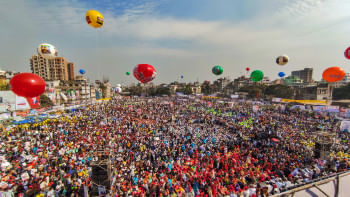It's Over, Finally

We're quite relieved that BNP's rally at the Golapbagh playground in Sayedabad, Dhaka has ended peacefully, with the party putting behind a dramatic build-up to the event to announce fresh programmes as well as a 10-point demand to the ruling party. Any tension arising from the acrimonious circumstances prevailing over the last few days was largely contained. Although a law-and-order approach to a political problem is itself a problem, we must acknowledge that finding common ground on the necessity of peace, for however brief a period, is also an achievement.
But peace or lack of violence, in this case, was not lack of suffering. As reported by the media, the ruling camp's response to the rally, putting the capital literally on hold, caused great misery for ordinary commuters. There was no public bus available, and obstruction to the movement of rickshaws, CNGs and private cars was reported in various areas. Many commuters, both within the city and on roads leading to it, reported being stopped and harassed on their way. The irony of the government's argument for not allowing the BNP rally at Naya Paltan – to avoid disruption to public life – was inescapable.
The same argument, however, was conveniently forgotten when ruling party leaders and activists occupied the streets and held rallies of their own there. What this shows is how, despite all the lip service to public interests, those mean little to the ruling party.
We must be apprehensive about the outcome of the BNP rally, too, which completed its months-long programme of 10 divisional rallies in the country. As was anticipated, seven MPs representing the party at parliament have announced their resignation, saying they were barred from speaking time and again and hence there was no point in staying in parliament. Public interests were again overlooked, for MPs represent not just their party but their constituents as well. Their mass resignation is an affront to the people who voted for them and trusted them to speak there on their behalf. BNP's 10-point demand – including dissolution of parliament, formation of a non-partisan caretaker government, etc. – represents key points of contention between the opposition and the ruling establishment, which are unlikely to be resolved anytime soon. From the look of things, the fierce resistance to these demands will continue, making peace more fragile. This is deeply alarming.
However, despite the apparent futility and repetitive nature of everything that happened over the last week, we must acknowledge that the impressive showing at the BNP event, with a large number of supporters from around the country staying overnight to make it a success, is a powerful statement by itself, which should not be lost on the powers that be. The message that it sends is: there are legitimate, long-simmering grievances that cannot be ignored anymore. If political parties could find common ground on peace, we hope they can do the same on other priorities of the public, including an end to their economic woes, respecting their inalienable human rights, and creating the ideal environment for free and fair elections.


 For all latest news, follow The Daily Star's Google News channel.
For all latest news, follow The Daily Star's Google News channel. 








Comments